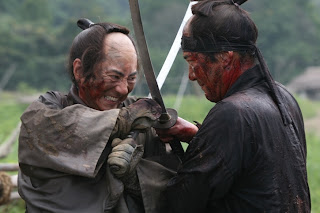
★★★/★★★★
I don't think anyone would argue when I say that Akira Kurosawa's 1954 epic The Seven Samurai is, indeed, the greatest samurai film ever made. The reasons are obvious. It not only captures, majestically, a bygone feudal milieu that shows the way civil strife leaves lawless savagery in its wake, but the film is a paradigm of action movie etiquette. The story structure is so iconic -- the rapid collection of role players for a common cause -- that it has been transplanted to all other cinema genres as well, from Oceans Eleven and Inception to The Replacements and Little Giants. The film's final sequence is a bravura display of action film staging and editing. It's relentless. Though it also leaves room for the exploration of cultural themes like honor, decency and sacrifice.
A bit like America's western gunslingers, samurai film samurais sit on a mythical pedestal of stylized super-heroics. They have a demigod reputation of otherworldly capabilities. They can cut down entire armies with one perfectly swift slash of a katana and they do it in the name of justice and dignity; they are massmurdering, kimono garbed boy-scouts. As exceptionally well made as Kurosawa's film is -- and as substantive as its themes may be -- it endorses the concept that samurais were more than human, and their battles were essential struggles that played out like biblical floods cleansing the earth of wickedness. Kurosawa had his points and made them well, but he didn't show war for what it truly was: gruesome, horrifying, wasteful.
Takashi Miike's film, "13 Assassins", is hardly in the same class as Kurosawa's masterpiece, but what it does is actually very interesting. It takes Kurosawa's model of samurai storytelling and makes it so shockingly brutal and horrific that it changes everything that we've come to think about the genre. The film's plot is intentionally close to The Seven Samurai, though instead of protecting a village the eponymous band -- twelve warriors and one sprightly goofball game-hunter (played by Yusuke Iseya doing his very best Toshiro Mifune impression) -- plan to ambush the royal entourage of the Shogun's son, Lord Naritsugu (Goro Inagaki), and assassinate him. Naritsugu is a merciless psychopath who, in the film's first minutes, indulges in a number of sadistic escapades: using an entire family as target practice for his bowhunting skills, rape and dismemberment (you get the picture). To make a long story short, we want him dead maybe more than the samurais do. The whole film leads up to an epic, prolonged final showdown between the thirteen assassins and Naritsugu and his army of two hundred bodyguards.
I had my doubts about "13 Assassins" for a lot of its two hour running time. It's a curiously campy and incompetent film, at least formally. Many of the outdoor compositions looked television cheap. One scene with a herd of flaming oxen looked no better than Sci-Fi Channel-level CGI. The same goes for several explosions and falling horses. The screen directions get confusing in the simplest dialogue scenes. In an arbitrary moment the focus blurred wildly and then adjusted without any creative liability, simply due to shabby camera operating. The sound design is crudely accentuated. The clashes and shwings of the swordplay and thwacks of blades on flesh are distractingly and humorously hyperbolic. My conclusion is that "13 Assassins" is either a masterwork of faux-unprofessionalism or a very amateurishly made film.
Still, this wouldn't be the first time that a film's brilliantly affecting qualities surpassed its technical fecklessness. (Just watch Clerks). "13 Assassins" has a final act of unblinkingly powerful imagery. The film's exaggerated opening atrocities led to some chuckles, but no one was laughing comfortably in the finale as the camera deliberately surveys the day's carnage and finds amongst the crumbling huts, pools of blood, fire and smoke a number of contorted corpses who look strangely similar to the valiant men of Kurosawa's honorable opus. Where is the honor in this? That's what Miike is saying. Is the director paying homage to the great Japanese master in his re-evaluation of The Seven Samurai or is he calling him out? Probably both. Miike's provocative approach to his culture's mythical folk heroes is an unexpected smack in the face for an audience expecting to see a genre exercise and getting a condemnation instead.
Interesting review. I even haven't seen Seven Samurai. Looks really good.
ReplyDelete